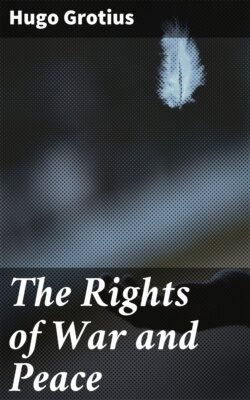Читать книгу The Rights of War and Peace - Hugo Grotius - Страница 5
На сайте Литреса книга снята с продажи.
II. The Predecessors of Grotius.
ОглавлениеTable of Contents
It is historically accurate to say, that, until formulated by Grotius, Europe possessed no system of international law. Others had preceded him in touching upon certain aspects of the rights and duties of nations, but none had produced a system comparable to his.
The earliest attempt to formulate recognized international customs was the formation of the early maritime codes, rendered necessary by the expansion of mediæval commerce from the end of the eleventh to the end of the sixteenth century, such as the "Jugemens d' Oléron," adopted by the merchants of France, England, and Spain, and reissued under other names for the merchants of The Netherlands and the Baltic. "The Consolato del Mare," a more elaborate compilation, was made, apparently at Barcelona, about the middle of the fourteenth century, and accepted generally by the traders of the chief maritime powers. It was in the cradle of commerce, therefore, that international law awoke to consciousness.
As the Church was often intrusted with the task of pacification, it is but natural to look among her representatives for the earliest writers on the laws of international relations. It is, in fact, among the theological moralists that we find the first students of this subject. As early as 1564, a Spanish theologian, Vasquez, conceived of a group of free states with reciprocal rights regulated by jus naturale et gentium, without regard to a world-power, either imperial or ecclesiastical. In 1612, Saurez pointed out that a kind of customary law had arisen from the usages of nations, and distinctly described a society of interdependent states bound by fundamental principles of justice.
At the close of the fifteenth and the beginning of the sixteenth centuries, a series of circumstances arose necessitating the extension of jurisprudence beyond its ancient boundaries, and thus tending to produce a group of international jurists. Among the juristic writers of this time are Balthazar Ayala, a Spanish jurisconsult, who died in 1584, having written in a historico-judicial spirit on the subject of war in his "De Jure et Officiis Belli"; Conrad Brunus, a German jurist, who wrote of the rights and duties of ambassadors in his "De Legationibus," published in 1548; and pre-eminent above all, Albericus Gentilis, an Italian professor of jurisprudence and lecturer at Oxford, a writer of force and originality, who published his "De Legationibus" in 1583 and his "De Jure Belli" in 1589.
